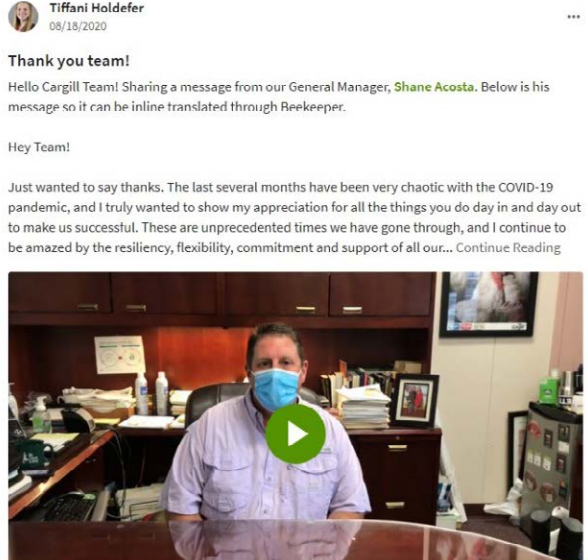Cargill’s protein business in N. America used digital tools to connect with frontline employees speaking more than 30 native languages.
Cargill, the global food corporation, is on a mission to nourish the world in a safe, responsible, and sustainable way. To do that, the company employs over 155,000 workers worldwide.
Like many globally dispersed manufacturing organizations, Cargill struggled to connect with the frontline employees at the heart of its business operations. This misalignment led to an expanding communication gap that, without the right digital tools in place to mitigate it, could impact operational efficiency and employee productivity.
An industry leader and competitive employer, Cargill moved quickly to adopt a mobile collaboration channel that would bridge the divide and engage frontline employees during a critical juncture in the life of the company.
Cargill’s protein business in North America employs more than 23,000 workers in production plants across the U.S. and Canada. Previously, they received important company information through videos, posters and bulletin boards. By relying upon these legacy communication vehicles, the company became vulnerable to growing communication challenges with their frontline workforce, such as an inability to communicate with an employee base that spoke more than 30 different languages, inconsistent two-way communication channels and growing organizational silos across various plants and locations.
Additionally, Cargill’s frontline communication gaps highlighted operational inefficiencies that were costing the business – and its frontline employees – time and energy. For instance, the company relied on paper-based processes, such as posting staffing schedules on jobsite bulletin boards.
Realizing these communication gaps were impacting operational efficiency at a great cost to the company, the Cargill protein team looked to integrate a mobile collaboration platform that would reach, connect and engage frontline workers regardless of physical location.
The communication gaps Cargill experienced have plagued the manufacturing industry for decades. Tackling language barriers, enabling digital access to both front- and back-office employees and optimizing internal processes are among the reasons many manufacturers today are considering digital technology to connect their widely dispersed workforces.
Today, factories worldwide are integrating next-generation tools, such as 5G, digital twins, robots and predictive maintenance, to keep up with the overwhelming industry trend toward workforce digitization. Despite this shift, organizational success for these employers hinges upon the essential workers that will keep production moving well into the future.
Cargill recognized the imperative to enable its on-the-go frontline workforce with digital tools that would bridge its communication divide. As a result, Cargill’s protein business in North America engaged Beekeeper in early 2020, a platform designed to provide real-time access to important company news and information. By digitizing operations with Beekeeper’s mobile platform, the protein team enacted a plan to address workforce language barriers with inline translations, digitize important documents and materials for mobile access and boost collaboration, connectivity, and empowerment across the frontline.
By February, the team was ready to pilot the new app in its first location. Then, the global pandemic hit, and the ability to quickly reach every employee, regardless of their location or native language, soon became mission-critical to the safety and success of their operations.
By December 2020, the Cargill team has successfully deployed the mobile platform across its protein businesse’s North American locations. In less than a year, the company achieved a 52% app activation rate, with some sites reaching as high as 96%.
Most importantly, the company successfully connected more than 15,000 previously non-wired employees, while also unlocking additional long-term benefits. Under the new communication infrastructure, the company established stronger frontline employee alignment with the company’s customer-driven culture and created safer workplace processes that no longer required physical gatherings or document sharing to execute. The roll-out also fostered open team, multilingual communication and elevated its frontline employee engagement overall.

Cargill’s protein business’ large-scale launch of the Beekeeper mobile app in North America defined new industry-leading best practices for rolling out new digital tools to frontline-majority organizations. Here are the critical steps to take when building out a high-impact deployment plan.
Understand your audience’s technology needs.
Before deciding on Beekeeper as their mobile app partner, Cargill established a cross-functional team to uncover what the communication gaps were, who was impacted, and how these challenges could be addressed.
Research and select the tool best-suited for your organization.
Following this initial discovery phase, Cargill researched multiple mobile platform providers and ultimately determined Beekeeper to be most in-line with their unique operational needs. Specifically, Cargill sought out Beekeeper for its inline translation capabilities and easy-to-use interface, as significant deciding factors in line with their company goals.
Create a launch strategy.
Cargill’s initial deployment plan looked a lot different from its final iteration. However, because of the tool’s flexibility and intuitive design, employee adoption was swift. As a result, the company launched the Beekeeper app across more than 40 Cargill Protein locations within its first year.
Designate internal champions.
The success of Cargill’s app deployment relied upon designated leaders at each Cargill’s protein locations, to oversee adoption and manage content. These local champions have a direct line of sight into what matters most to their frontline employees onsite. As a result, those employees could engage with the platform in a personalized way that fostered continued use of the technology for the long-term.

About the Author
Cris Grossmann is CEO and Co-Founder of Beekeeper, a secure, mobile-first operational communications platform for frontline teams. Beekeeper helps companies connect their distributed workforces to increase productivity and employee engagement. Prior to founding Beekeeper, Cris worked for Accenture on high-profile international projects in the field of IT Strategy for the financial and public sectors. Cris studied Chemical Engineering and got his Ph.D. in Electrical Engineering, both at ETH Zurich. Before moving to beautiful Zurich, Cris was born and raised in an entrepreneurial Swiss-Mexican family in Mexico City.
Scott Ellyson, CEO of East West Manufacturing, brings decades of global manufacturing and supply chain leadership to the conversation. In this episode, he shares practical insights on scaling operations, navigating complexity, and building resilient manufacturing networks in an increasingly connected world.